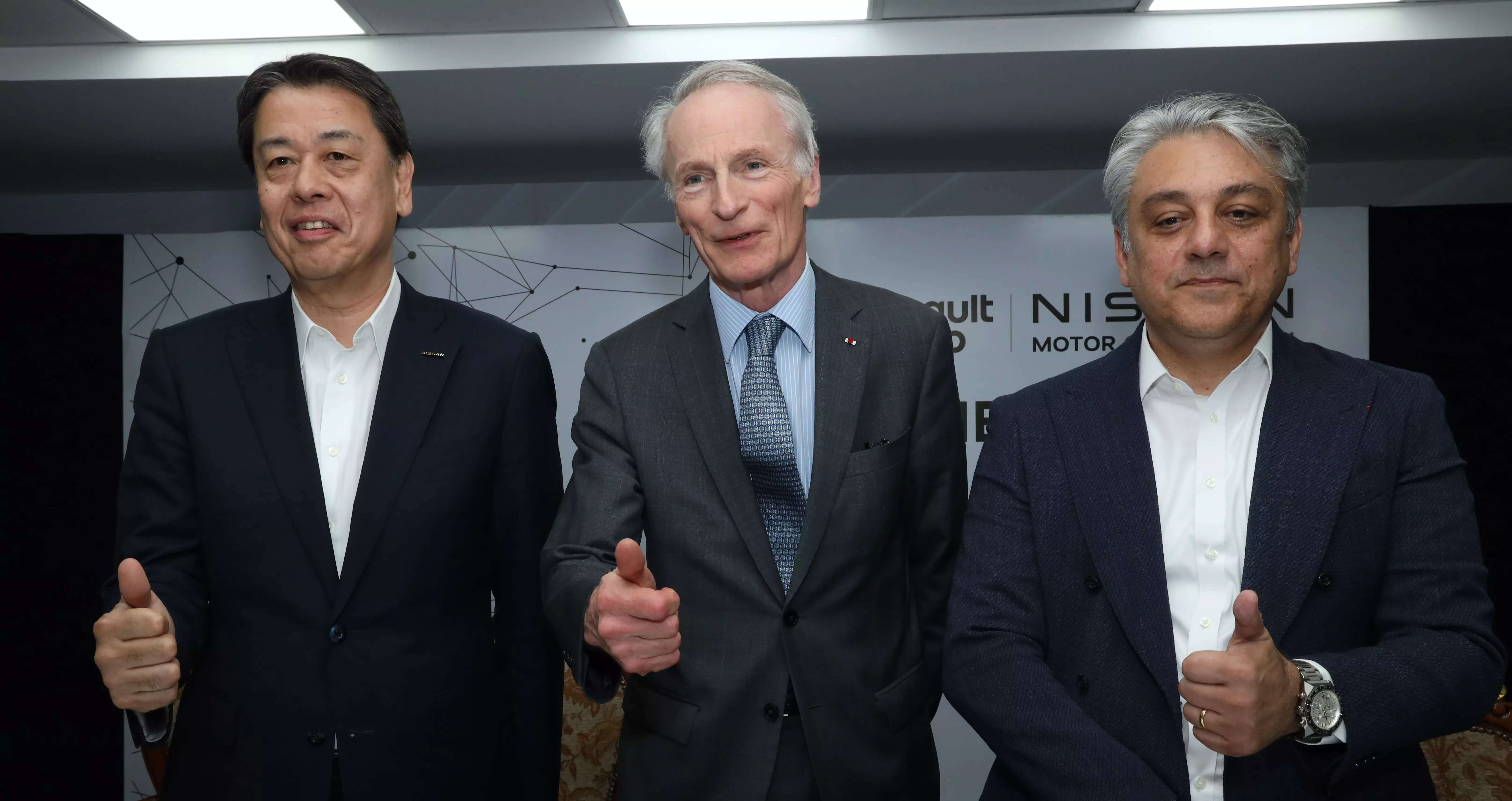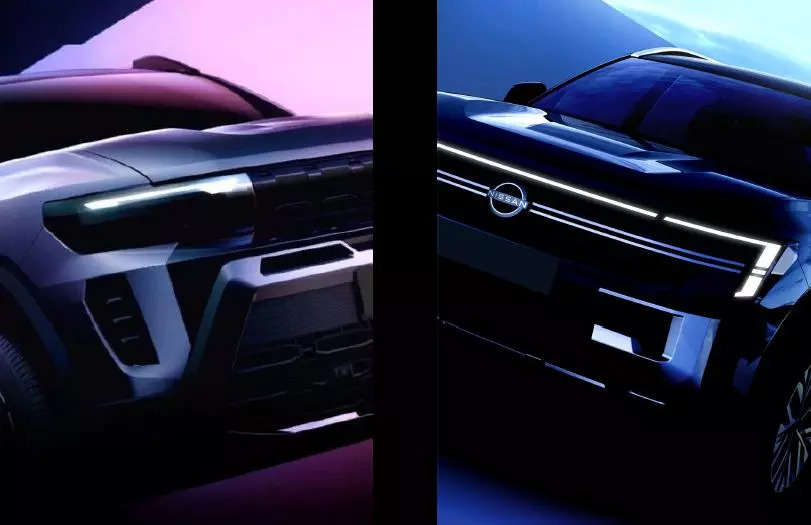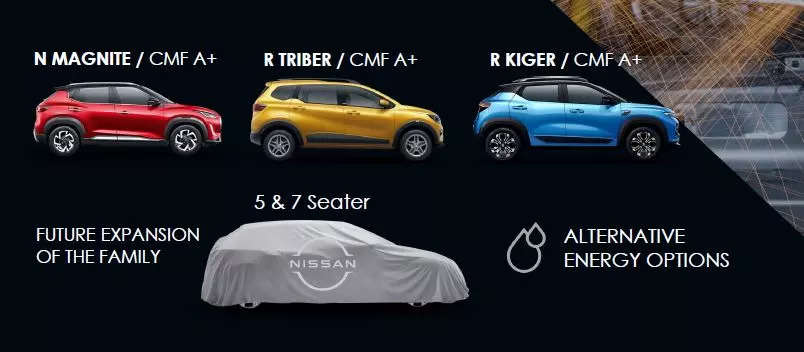
New Delhi: The Renault Nissan Alliance will launch four new products with both the companies bringing two new localised 5 and 7-seater C-SUV models each in India.
Renault Nissan Automotive India Pvt Ltd is an alliance between Japanese automaker Nissan and the French Renault in India. The joint venture has invested USD 1.8 billion in the country so far.
Without giving a specific launch timeline, the companies said the new SUVs will be based on the alliance’s Common Modular Family-B segment (CMF-B) platform and will come to the markets no later than 2025. The new platform has already produced about a million cars in the world, localized in South America, Turkey, Romania, and Morocco.
Renault Kwid was the first product on the Renault-Nissan CMF-A platform, followed by Nissan Magnite, Renault Kiger and Triber which are based on the modified version of this platform, called CMF-A+.
Speaking to the media in India on the 25th anniversary of the two companies signing their alliance agreement, Jean-Dominique Senard, Chairperson, Renault Nissan Alliance said, “India is not just a market, it is a vibrant ecosystem of limitless opportunities.”
“Our future plans for the Alliance in India include the development of our line-ups for Indian markets and for export, but also the enhancement of new technologies, such as autonomous driving, connectivity, and electrification, for global markets,” he said.
Admitting that the new development is somehow late, Luca de Meo, CEO, Renault Group said, “In the past, the only thing we were focusing on was trying to get the cheapest possible car to get access to mobility, but the market has changed a lot, so we have to be a little bit more creative. We do not aim to overtake Maruti Suzuki or Tata Motors, these are local players who are doing it for their domestic market like anybody would do. These are big boys here.”
“We need to find our secret sauce. We are here to do the right job, and by our means we want to propose to the Indian customers what they want. We need to justify our presence with a plant and a technical center with sustainable business,” he said.
“We are here to prove that India will play an increasingly important role in the alliance and each one of the companies. India is not an easy market for OEMs though, it is very competitive. A lot of carmakers had to bite the dust,” Meo added.
Referring to Renault’s history of 17 years in the country, he said, “We were amongst the first to believe in the potential of the Indian market. We are probably right now in a low point of our lifecycle in India, but we had the opportunity to prove that we could be very successful in this market.”
Currently, Renault-Nissan together account for less than 2% of the share in the Indian passenger vehicle market. Leveraging on its strengths on Renault Nissan Technology & Business Centre India (RNTBCI), which constitutes 2/3rd of its total employees in the country, the alliance aims to build its story in this market.
RNTBCI is the the automakers’ global centre of excellence (CoE). With about 10,000 people here, its role extends to global projects including markets such as North America, Europe, and Latin America. The CAE centre at RNTBCI is one of the largest outside France and Japan, and the Indian team has the responsibility to validate a car’s durability, crash worthiness, noise, vibration and harshness, to name a few.
Makoto Uchida, President & CEO, Nissan Motor Corporation noted that the alliance team is also working to introduce alternative energy options, such as compressed natural gas and compatibility with ethanol.
“All our combined efforts in India will contribute to Nissan’s business plan, the Arc which we have just announced. As part of which, India will be a hub for exports at 1 lakh level for Nissan during the mid-term,” he added.
Talking about the game plan on electric vehicles (EVs), Meo said, “We are entirely rethinking our strategy. We need to do that because we know it is crucial, and we want to come up with a plan that will be solid, effective and sustainable. And for this key area, public support will be key.”
“The second thing that is clear is that government support is going to be key to make the story work. We need the authorities to create the right business conditions,” he said.
The alliance plant Renault Nissan Automotive India Pvt Ltd (RNAIPL) in Chennai has produced 2.7 million cars until now, including 1.2 million units exported to over 100 countries. It has also produced around 4.4 million powertrains. The plant currently produces Nissan Magnite and Renault’s Kiger and Triber.
Nissan global business plan ‘Arc’
Nissan Motor Company on Monday launched its new business global plan ‘Arc’ where it plans to launch three all-new models in India by FY26 and make the country a hub for exports.
The new plan is split into mid-term imperatives for FY24 through FY26, and mid-long-term actions to be carried out through FY30. The company is targeting additional 10 lakh unit sales compared to FY23.
Globally, Nissan plans to launch 30 new models over the next three years, including 16 EVs, and 14 internal combustion engine (ICE) models.
It plans to launch a total of 34 electrified models from FY24 and FY30 to cover all segments, with the model mix of EVs expected to account for 40% globally by FY26 and rise to 60% by the end of the decade.
In India, Nissan serves the domestic and export markets via its wholly-owned arm, Nissan Motor India Pvt Ltd (NMIPL), which was incorporated in 2010.


















